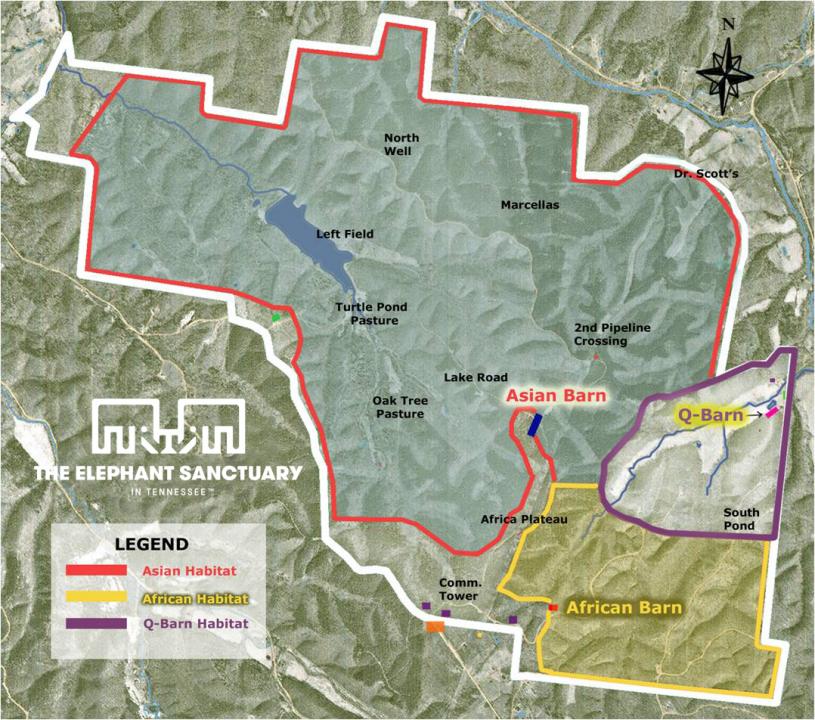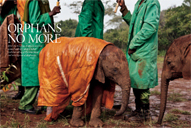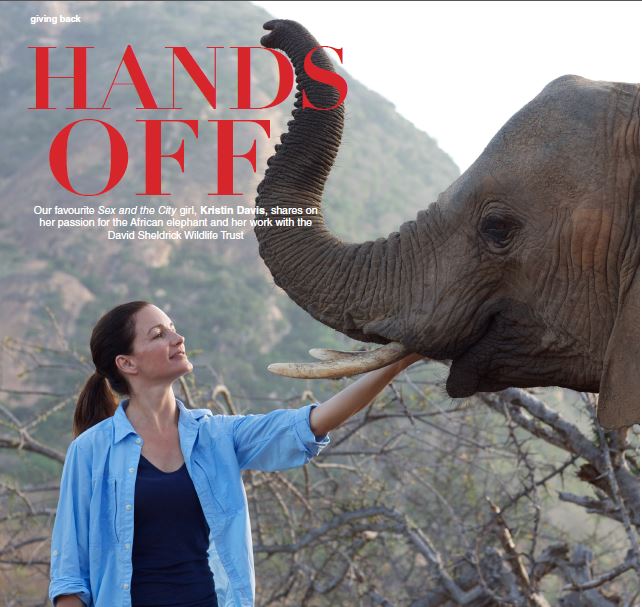The Sustainable Action Network features The Elephant Sanctuary in Tennessee, David Sheldrick Wildlife Trust & Elephant Orphanage & Thanksgiving In The United States!
Thanksgiving In The United States. A look at the scale and pace turkey consumption in the U.S., an exploration of some reasons why turkeys are such amazing animals, and some quick and easy recipes that may help you with your Thanksgiving meal. A very quick resource to share with friends and family around the holiday season.



 Faunalytics is a nonprofit research organization dedicated to helping animals by providing useful information to advocates to help them increase their impact.
Faunalytics is a nonprofit research organization dedicated to helping animals by providing useful information to advocates to help them increase their impact.
 Faunalytics conducts essential research like impact evaluations, opinion polls, audience surveys, focus groups and other types of studies. Our results can help you understand how people think, so you can choose the best ways to influence them. Our history shows a dedication to our mission: to make you more powerful in creating change for animals.
Faunalytics conducts essential research like impact evaluations, opinion polls, audience surveys, focus groups and other types of studies. Our results can help you understand how people think, so you can choose the best ways to influence them. Our history shows a dedication to our mission: to make you more powerful in creating change for animals.
The Elephant Sanctuary maintains three separate habitats with heated barns, solar water pumps, hay storage buildings, spring-fed lakes, pastures and woodlands, fencing, four onsite security houses, and miles of internal maintenance roads. Wherever possible, The Elephant Sanctuary uses energy-efficient materials to reduce overhead costs. Secure fencing, sound structures, and dependable machinery are an absolute necessity for a Sanctuary that is safe for both elephants and people.
The Facilities Team includes Director of Facilities, Supervisor, and eight full-time Maintenance Staff. The Team also includes a full-time Safety Coordinator and a Commissary Manager focusing on increased safety and reduced costs.
Today at The Elephant Sanctuary, the elephants are managed in a Protected Contact (PC) system using positive reinforcement. Along with a spacious natural habitat and access to others of their own kind, the elephants at The Elephant Sanctuary receive individualized veterinary and husbandry care, diverse environmental enrichment, and the freedom of choice.
The elephants' habitats are closed to the public
 Whole Elephant Care
Whole Elephant Care
The majority of the elephants now living in captivity were captured from the wild before the age of two. Separation from their families and bonded social groups at a young age often negatively impacts their social development and behavior as adults. Elephants imported to North America as recently as the 1980s for public entertainment were trained and managed using the traditional methods of negative reinforcement or punishment and in a method based on humans being a dominant member of the herd.
The Elephant Sanctuary continually works to assess the impact of captivity in evaluating the health, social and psychological wellbeing of individual Sanctuary elephants and in planning for their lifetime best care.
Expansive, diverse habitats, and appropriate social groupings have been shown to have a positive influence on an elephant’s overall health, both physically and mentally. An animal’s behavior is the standard for judging physical and psychological wellbeing. When given the opportunity, elephants will spend a great deal of time traveling, eating, and socializing. Spacious natural habitats allow elephants the choice to separate if individuals are not compatible on any given day, and diverse habitats relieve boredom for these highly intelligent animals. Ample opportunity to roam and move at their own preferred pace helps maintain healthy feet, joints, and limbs.
Whole Elephant Care at The Elephant Sanctuary is provided by a Team comprised of Director of Veterinary Care, Associate Veterinarian, Registered Veterinary Technicians, Director of Elephant Husbandry, Elephant Care Manager, and 15 full-time Caregivers. Caregiver staff undergo extensive training on elephant behavior, husbandry, and all of the aspects needed to properly care for elephants as a species but also learn to care for the specific and individual needs of the elephants that call The Elephant Sanctuary home.
The Elephant Sanctuary currently provides safe haven and care to 10 elephants permanently residing in three separate areas on a 2,700-acre preserve of forest, ponds, and pasture in southwest Middle Tennessee. These three areas do not share fencing or barns.
New elephants coming to Sanctuary are housed separately and are not introduced to other elephants until their health status is fully assessed by The Sanctuary’s Veterinary Team and an individualized care plan has been put in place by the Elephant Husbandry Team.
To meet the daily needs of elephants in care, The Sanctuary provides:
Protected Contact (PC) Management
All elephants at The Elephant Sanctuary are managed in a Protected Contact (PC) system.
The Sanctuary defines Protected Contact as: a system for managing elephants that uses positive reinforcement training as the primary method to modify behavior; the use of physical punishment is prohibited. Directing the positioning and movement of the elephant is achieved through the use of targets and positive reinforcement. Caregiver safety is achieved by elephant and Caregiver positioning relative to each other and to a barrier, which typically separates human and animal spaces.
In the PC system, Caregivers function outside the elephant social hierarchy and do not attempt to establish a position of social dominance. If an elephant chooses not to cooperate, at no time is physical punishment used to achieve compliance. Elephants choose whether or not they wish to cooperate with Caregivers. A fundamental aspect of The Elephant Sanctuary is the belief that elephants need access to other elephants, vast and diverse habitats, and the freedom of choice about decisions that affect them. Choices such as whom they spend time with and when, what and where they eat, and when and where they sleep are choices that each elephant is free to make for herself. Deciding when and where to graze, when to submerge in a pond or enter the woods and how long to remain there are all decisions that may seem simple but are vital to the well-being of the individual elephant.
Behavioral Assessment and Management
Behavioral assessment and management are important components of how the elephants are cared for at The Elephant Sanctuary.
The Sanctuary defines Behavioral Management as: a pro-active approach to managing captive animals to provide the best care and the highest level of wellbeing. Diverse environmental enrichment and positive reinforcement training are two fundamental techniques. Consideration is given to operational procedures and facility issues that may impact behavior, and these are modified when necessary. Approaches are continually assessed and measured to determine if behavioral goals have been met and if methods for managing behaviors have been successful. A behavioral management approach has tremendous potential to directly and positively affect changes towards each elephant’s enhanced wellbeing. One of the most important and challenging components of the management system used at Sanctuary is the concept of time. Elephants at The Elephant Sanctuary are allowed to operate at their own time, not ours. Although they are creatures of habit whose movements can be anticipated, their movements are not directed unless necessary for their own health. They are not ruled by our time clocks or schedules; instead, the Caregiver Staff will adjust their daily routine to accommodate the needs and actions of the elephants.
David Sheldrick Wildlife Trust & Elephant Orphanage. Born from one family’s passion for Kenya and its wilderness, the David Sheldrick Wildlife Trust is today the most successful orphan-elephant rescue and rehabilitation program in the world and one of the pioneering conservation organisations for wildlife and habitat protection in East Africa.
Founded in 1977 by Dr. Dame Daphne Sheldrick D.B.E, in honour of the memory of her late husband, famous naturalist and founding Warden of Tsavo East National Park, David Leslie William Sheldrick MBE, the DSWT claims a rich and deeply rooted family history in wildlife and conservation.
The David Sheldrick Wildlife Trust embraces all measures that compliment the conservation, preservation and protection of wildlife. These include anti-poaching, safe guarding the natural environment, enhancing community awareness, addressing animal welfare issues, providing veterinary assistance to animals in need, rescuing and hand rearing elephant and rhino orphans, along with other species that can ultimately enjoy a quality of life in wild terms when grown.
At the heart of the DSWT’s conservation activities is the Orphans’ Project, which has achieved world-wide acclaim through its hugely successful elephant and rhino rescue and rehabilitation program. The Orphans’ Project exists to offer hope for the future of Kenya’s threatened elephant and rhino populations as they struggle against the threat of poaching for their ivory and horn, and the loss of habitat due to human population pressures and conflict, deforestation and drought.
To date the David Sheldrick Wildlife Trust has successfully hand-raised over 150 infant elephants and has accomplished its long-term conservation priority by effectively reintegrating orphans back into the wild herds of Tsavo, claiming many healthy wild-born calves from former-orphaned elephants raised in our care.
The DSWT has remained true to its principles and ideals, remaining a sustainable and flexible organization. Guided by experienced and dedicated Trustees and assisted by an Advisory Committee of proactive naturalists with a lifetime of wildlife and environmental experience, the Trust takes effective action and achieves long-lasting results.
Chaired by Daphne Sheldrick, the DSWT is run by Angela Sheldrick, the daughter of David and Daphne, who has been managing all of the Trust’s activities for over a decade. Growing up in Tsavo and later in the Nairobi National Park, Angela has been part of the Trust’s vision from the start, supported by her husband Robert Carr-Hartley and their two boys Taru and Roan, who are passionate about Kenya’s wildlife and eager to ensure that David and Daphne’s legacy continues.
In 2004 the DSWT was incorporated as a Charitable Company in the U.K. and granted charitable status by the Charities Commission, whilst during the same year the Trust has also attained US Charitable status enhancing its corporate funding capability under the guidance of the U.S. Friends of the David Sheldrick Wildlife Trust.
(pdf article) (pdf interview) (pdf article) (pdf article)


(pdf article) (pdf article) (pdf article)





Faunalytics is an organization committed to providing rigorous research and high quality data. Our Research Library contains a carefully curated collection of thousands of studies that have been summarized by trained personnel and experienced volunteers. We strive to include the best available research on animal issues and make an effort to note when methodologies don’t meet a rigorous standard. Our independent studies are designed and conducted by personnel with decades of collective research experience, and are reviewed by the advocacy community for quality and usefulness to animal advocates.
Here’s how we ensure the data we provide are of the highest quality:
- Each item in our research library clearly indicates whether or not it was peer-reviewed by the scientific community. Peer-reviewed sources are used whenever possible.
- All of Faunalytics’ major independent studies are reviewed by other researchers in the animal advocacy community before they are run.
- Our researchers are trained in social science methodology and statistics: The research director has a PhD and postdoctorate in social psychology (Waterloo, 2012; Cornell, 2014). We also have volunteers with masters’ degrees and PhDs in various fields.
- Faunalytics pre-registers the design and hypotheses for all independent studies and provides open access to study materials and de-identified datasets, to encourage scientific transparency, review, and replicability.
- We conduct power analyses for all new studies to ensure that sample sizes are large enough to detect meaningful effects.
- We use nationally representative, census-balanced participant samples for all major studies that are intended to produce population estimates.
The Facilities Team includes Director of Facilities, Supervisor, and eight full-time Maintenance Staff. The Team also includes a full-time Safety Coordinator and a Commissary Manager focusing on increased safety and reduced costs.
Today at The Elephant Sanctuary, the elephants are managed in a Protected Contact (PC) system using positive reinforcement. Along with a spacious natural habitat and access to others of their own kind, the elephants at The Elephant Sanctuary receive individualized veterinary and husbandry care, diverse environmental enrichment, and the freedom of choice.
The elephants' habitats are closed to the public

The majority of the elephants now living in captivity were captured from the wild before the age of two. Separation from their families and bonded social groups at a young age often negatively impacts their social development and behavior as adults. Elephants imported to North America as recently as the 1980s for public entertainment were trained and managed using the traditional methods of negative reinforcement or punishment and in a method based on humans being a dominant member of the herd.
The Elephant Sanctuary continually works to assess the impact of captivity in evaluating the health, social and psychological wellbeing of individual Sanctuary elephants and in planning for their lifetime best care.
Expansive, diverse habitats, and appropriate social groupings have been shown to have a positive influence on an elephant’s overall health, both physically and mentally. An animal’s behavior is the standard for judging physical and psychological wellbeing. When given the opportunity, elephants will spend a great deal of time traveling, eating, and socializing. Spacious natural habitats allow elephants the choice to separate if individuals are not compatible on any given day, and diverse habitats relieve boredom for these highly intelligent animals. Ample opportunity to roam and move at their own preferred pace helps maintain healthy feet, joints, and limbs.
Whole Elephant Care at The Elephant Sanctuary is provided by a Team comprised of Director of Veterinary Care, Associate Veterinarian, Registered Veterinary Technicians, Director of Elephant Husbandry, Elephant Care Manager, and 15 full-time Caregivers. Caregiver staff undergo extensive training on elephant behavior, husbandry, and all of the aspects needed to properly care for elephants as a species but also learn to care for the specific and individual needs of the elephants that call The Elephant Sanctuary home.
The Elephant Sanctuary currently provides safe haven and care to 10 elephants permanently residing in three separate areas on a 2,700-acre preserve of forest, ponds, and pasture in southwest Middle Tennessee. These three areas do not share fencing or barns.
New elephants coming to Sanctuary are housed separately and are not introduced to other elephants until their health status is fully assessed by The Sanctuary’s Veterinary Team and an individualized care plan has been put in place by the Elephant Husbandry Team.
To meet the daily needs of elephants in care, The Sanctuary provides:
- - Food, including browse, hay, fruits, vegetables, and treats. Mazuri, grains, and fresh produce are purchased from a variety of sources including local farmers.
- - Supplements to address deficiencies and health issues common to aging elephants in captivity.
- Ongoing husbandry care and medical treatment including foot care, pain medication, laser therapy, and routine radiographic monitoring of chronic illnesses such as osteomyelitis. At The Sanctuary, a separate habitat with barns has been specifically established for the management, care and enrichment of elephants with known exposure to tuberculosis. This facility has a separate entrance and separate staff.
Protected Contact (PC) Management
All elephants at The Elephant Sanctuary are managed in a Protected Contact (PC) system.
The Sanctuary defines Protected Contact as: a system for managing elephants that uses positive reinforcement training as the primary method to modify behavior; the use of physical punishment is prohibited. Directing the positioning and movement of the elephant is achieved through the use of targets and positive reinforcement. Caregiver safety is achieved by elephant and Caregiver positioning relative to each other and to a barrier, which typically separates human and animal spaces.
In the PC system, Caregivers function outside the elephant social hierarchy and do not attempt to establish a position of social dominance. If an elephant chooses not to cooperate, at no time is physical punishment used to achieve compliance. Elephants choose whether or not they wish to cooperate with Caregivers. A fundamental aspect of The Elephant Sanctuary is the belief that elephants need access to other elephants, vast and diverse habitats, and the freedom of choice about decisions that affect them. Choices such as whom they spend time with and when, what and where they eat, and when and where they sleep are choices that each elephant is free to make for herself. Deciding when and where to graze, when to submerge in a pond or enter the woods and how long to remain there are all decisions that may seem simple but are vital to the well-being of the individual elephant.
Behavioral Assessment and Management
Behavioral assessment and management are important components of how the elephants are cared for at The Elephant Sanctuary.
The Sanctuary defines Behavioral Management as: a pro-active approach to managing captive animals to provide the best care and the highest level of wellbeing. Diverse environmental enrichment and positive reinforcement training are two fundamental techniques. Consideration is given to operational procedures and facility issues that may impact behavior, and these are modified when necessary. Approaches are continually assessed and measured to determine if behavioral goals have been met and if methods for managing behaviors have been successful. A behavioral management approach has tremendous potential to directly and positively affect changes towards each elephant’s enhanced wellbeing. One of the most important and challenging components of the management system used at Sanctuary is the concept of time. Elephants at The Elephant Sanctuary are allowed to operate at their own time, not ours. Although they are creatures of habit whose movements can be anticipated, their movements are not directed unless necessary for their own health. They are not ruled by our time clocks or schedules; instead, the Caregiver Staff will adjust their daily routine to accommodate the needs and actions of the elephants.
David Sheldrick Wildlife Trust & Elephant Orphanage. Born from one family’s passion for Kenya and its wilderness, the David Sheldrick Wildlife Trust is today the most successful orphan-elephant rescue and rehabilitation program in the world and one of the pioneering conservation organisations for wildlife and habitat protection in East Africa.
Founded in 1977 by Dr. Dame Daphne Sheldrick D.B.E, in honour of the memory of her late husband, famous naturalist and founding Warden of Tsavo East National Park, David Leslie William Sheldrick MBE, the DSWT claims a rich and deeply rooted family history in wildlife and conservation.
The David Sheldrick Wildlife Trust embraces all measures that compliment the conservation, preservation and protection of wildlife. These include anti-poaching, safe guarding the natural environment, enhancing community awareness, addressing animal welfare issues, providing veterinary assistance to animals in need, rescuing and hand rearing elephant and rhino orphans, along with other species that can ultimately enjoy a quality of life in wild terms when grown.
At the heart of the DSWT’s conservation activities is the Orphans’ Project, which has achieved world-wide acclaim through its hugely successful elephant and rhino rescue and rehabilitation program. The Orphans’ Project exists to offer hope for the future of Kenya’s threatened elephant and rhino populations as they struggle against the threat of poaching for their ivory and horn, and the loss of habitat due to human population pressures and conflict, deforestation and drought.
To date the David Sheldrick Wildlife Trust has successfully hand-raised over 150 infant elephants and has accomplished its long-term conservation priority by effectively reintegrating orphans back into the wild herds of Tsavo, claiming many healthy wild-born calves from former-orphaned elephants raised in our care.
The DSWT has remained true to its principles and ideals, remaining a sustainable and flexible organization. Guided by experienced and dedicated Trustees and assisted by an Advisory Committee of proactive naturalists with a lifetime of wildlife and environmental experience, the Trust takes effective action and achieves long-lasting results.
Chaired by Daphne Sheldrick, the DSWT is run by Angela Sheldrick, the daughter of David and Daphne, who has been managing all of the Trust’s activities for over a decade. Growing up in Tsavo and later in the Nairobi National Park, Angela has been part of the Trust’s vision from the start, supported by her husband Robert Carr-Hartley and their two boys Taru and Roan, who are passionate about Kenya’s wildlife and eager to ensure that David and Daphne’s legacy continues.
In 2004 the DSWT was incorporated as a Charitable Company in the U.K. and granted charitable status by the Charities Commission, whilst during the same year the Trust has also attained US Charitable status enhancing its corporate funding capability under the guidance of the U.S. Friends of the David Sheldrick Wildlife Trust.
 |  |  |  |



(pdf article) (pdf article) (pdf article)



